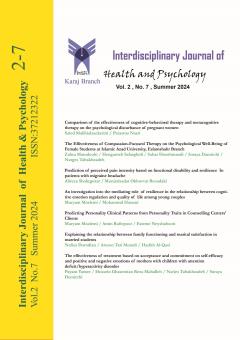An investigation into the mediating role of resilience in the relationship between cognitive emotion regulation and quality of life among young couples Maryam Moslemi / Mohammd Hatami
Subject Areas : Family Health Psychology
Keywords: Keywords: resilience, cognitive emotion regulation, quality of life, couples,
Abstract :
Abstract Purpose: Research shows resilience is an important factor in a number of groups exposed to danger and plays a very vital mediating role in the appearance of many psychological disorders.The current study was carried out with the aim of examining the mediating role of resilience in the relationship between cognitive emotion regulation and quality of life among young couples. Method: This is a correlational study, the statistical population of which includes all married students of Islamic Azad University of Shahroud, out of whom 45 couples were selected using convenience sampling. Then, Conner-Davidson Riesilience Scale (CD-RISC) (2003), Garnefski, Kraaji and Spinhoven Cognitive Emotion Regulation Questionnaire (CERQ) (2001) and the World Health Organization Quality of Life Assessment (WHOQOL) were completed by the participants. The data were analyzed with the Pearson correlation coefficient and multiple regression. Results: The findings indicate cognitive emotion regulation and the quality of life are significant positive predictors of resilience. Resilience has a significant mediating role in the relationship between cognitive emotion regulation and the quality of life among couples. Conclusion: According to the results it can be said the strategies used by couples to regulate their emotions can be a highly determining factor in their resilience, which leads to a higher quality of life. Improving the positive strategies of cognitive emotion regulation can be taken for preparing interventions and educational programs of resilience into attention.
منابع
اندامی¬خشک، علیرضا. (1392). نقش واسطه¬ای تاب¬آوری در رابطه بین تنظیم شناختی هیجان و تحمل پریشانی با رضایت از زندگی. پایان¬نامه کارشناسی ارشد روان¬شناسی. دانشگاه علامه طباطبایی. پردیس آموزش¬های نیمه حضوری.
بهرامی، بتول؛ بهرامی، عبدالله؛ مشهدی، علی؛ کارشکی، حسین. (1394). نقش راهكارهاي كنترل شناختی هيجان در كيفيت زندگی بيماران سرطانی. مجله دانشكده پزشكی دانشگاه علوم پزشكی مشهد. 58(2): 105-96.
جوکار، بهرام.(1386). نقش واسطه¬ای تاب¬¬آوری در ارتباط بین هوش هیجانی و هوش عمومی با رضایت از زندگی. روان¬شناسی معاصر. 2(4): 3-12.
عزیزی، آرمان؛ ابراهیمی، ثریا؛ طالبی، ریحانه؛ محمدی، فاروق. (1395). کیفیت زندگی و بهزیستی ذهنی و ارتباط آنها با تنظیم شناختی هیجان در مردان متأهل. سومین کنفرانس بین المللی پژوهش¬های نوین در مدیریت، اقتصاد و علوم انسانی. باتومی. موسسه سرآمد همایش کارین. www.icmeh.org.
فتحی، افشار؛ خیر، محمد؛ عتیق، مهدی. (1390). رابطه بين خودکارآمدي و کيفيت زندگي با توجه به نقش واسطه¬اي تاب¬آوري در ¬بين بيماران قلبي- عروقي. روش¬ها و مدل¬هاي روان¬شناختي. 3: 122-103.
نجفی، محمود؛ کمری، علی عباس؛ عرفانی، نصرت اله؛ جعفری، نصرت؛ پیرخائفی، علیرضا. (1393). نقش مؤلفه¬های کیفیت زندگی همسران جانبازان در پیش بینی سلامت عمومی فرزندان. فصلنامه فرهنگ مشاوره و روان درمانی. 5(19): 138-123.
نظامی پور، الهام؛ احدی، حسن. (1395). تأثیر راهبردهای تنظیم شناختی هیجان بر رابطه بین ویژگی¬های شخصیتی و کیفیت زندگی بیماران دیالیزی. مجله دانشگاه علوم پزشکی قم. 10(2): 80-71.
Allen, E. S., Rhoades, G. K., Stanley, S. M., Loew, B., & Markman, H. J. (2012). The effects of marriage education for army couples with a history of infidelity. Journal of Family Psychology, 26(1), 26.
Azizi B, Radpey L, & Alipour O.(2015). The Relation Between Regulation Strategies and Marital Satisfaction of Youths in Sardasht . Indian Journal of Fundamental and Applied Life Sciences ISSN; 5 (1), 5555-556.
Belsky J.(2002). Developmental origins of attachment styles. Attachment & Human Development 4(2): 166-70.
Bolton KW. The development and validation of the resilience protective factors Inventory: A confirmatory factor analysis [Dissertation]. University of Texas at Arlington; 2013.
Brown DW, Bulluz LS.( 2001). Association between recommended levels of physical activity and health related quality of life. Prev Med; 37: 520-528.
Carlson, J.M., Dikecligil, G.N., Greenberg, T., & Mujica-Parodi, L.R. (2012). Trait reappraisal is associated with resilience to acute psychological stress. Journal of Research in Personality, 46,609–613.
-Černe A. et al. (2012). Quality of Life and Alcohol Consumption: A Review Of the Literature. Solvenian Journal of Public Health, 51:147-54.
Connor KM, Davidson JR. Development of a new resilience scale: the Connor-Davidson Resilience Scale (CD-RISC). Depress Anxiety 2003; 18(2): 76-82.
Erol Ongen, D. (2010). Cognitive emotion regulation in the prediction of depression and submissive
behavior: Gender and grade level differences in Turkish adolescents. Procedia Social and
Behavioral Sciences. 9, 1516-1523.
Eilertsen M.E, Hjemdal O, Le T.T, Diseth T.H, Reinfjell T. Resilience factors play an important role in the mental health of parents when children survive acute lymphoblastic leukaemia. Acta paediatrica. 2016; 105(1): 30-4.
Garnefski, N., Koopman, H., Kraaij, V., & Cate, R. T. (2009). Brief report: cognitive emotion regulation strategies and psychological adjustment in adolescents with a chronic disease. Journal of Adolescence, 32, 449-454.
Hamilton NA, Karoly P, Gallagher M, Stevens N, Karlson C, McCurdy D. (2009). The assessment of emotion regulation in cognitive context: the emotion amplification and reduction scales. Cognitive Therapy and Research; 33(3): 255-63.
James Spencer L. (2015).Variation in trajectories of women’s marital quality. Journal of Social Science Research. 29 (3): 479- 489.
Levenson, R.W., Haase, C.M., Bloch, L., Holley, S., & Seider, B.J. (2013). Emotion regulation in couples. In J. J. Gross (Ed.), Handbook of emotion regulation (2nd ed.). New York, NY: The Guilford Press
Linden D. (2014). EPA-1819 - Regulation of emotion networks in depression. European Psychiatry 29( Suppl 1): 1.
Mac Gee, E.A. (2011). An examination of the stability of positive psychological capital using frequency-based measurement. PhD dissertation, University of Tennessee. http:// trace.tennesee.edulatk-graddiss/ 999.
Maria L. Barca., Knut, Engedal., Jerson, Laks., & Geir, Selbæk. (2011). Quality of Life among Elderly Patients with Dementia in Institutions. Dement Geriatr Cogn Disord ; 31:435– 442.
Melvin, KC., Gross, D., Hayat, MJ., Jennings, BM., Campbell, JC. (2012). Couple functioning and post-traumatic stress symptoms in US Army couples: The role of resilience. Research in Nursing & Health, 35 (2): 164-177.
ochsner, K. N., & Gross, J. J. (2005). The cognitive control of emotion. Trends in Cognitive Science, 9, 242- 249.
Ronaldof, F., Levant, Rosali, J. Hall, Christine M, Williams, & Nadia T.Hasan. (2013). Gender.
university of Akron. American psychological Association . V 12,P:13-14.
Schreiber, L. R., Grant, J. E., & Odlaug B. L. (2013). Emotion regulation & impulsivity in young adults. Journal of Psychiatric Research, 46 (5), 651-8.
Skerrett K. Fergus K.(2015). Couple Resilience: Emerging Perspectives Kindle Edition. New York: Springer.
Troy, A.S., & Mauss, I.B. (2011). Resilience in the face of stress: emotion regulation as a protective factor. In S.M, Southwick, & B.T, Litz, & D, Charney, & M.J, Friedman. (Eds.), Resilience and Mental Health: Challenges Across the Lifespan ((pp. 30-44). London: Cambridge University Press.
Zlomke, K.R., & Hahn, K.S.(2010). Cognitive emotion regulation strategies: Gender differences and
associations to worry. Personality and Individual Differences. 48, 408-413.

